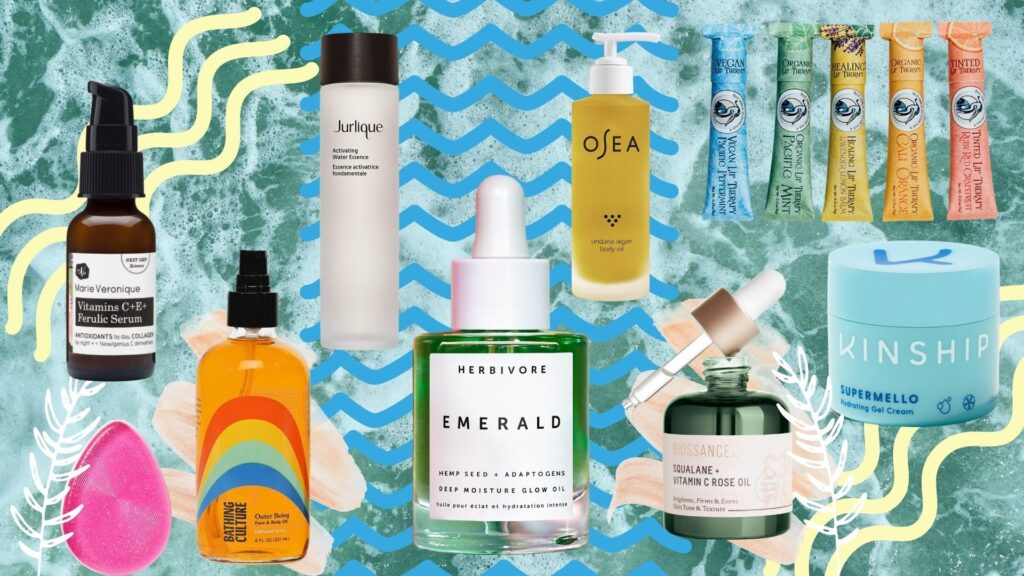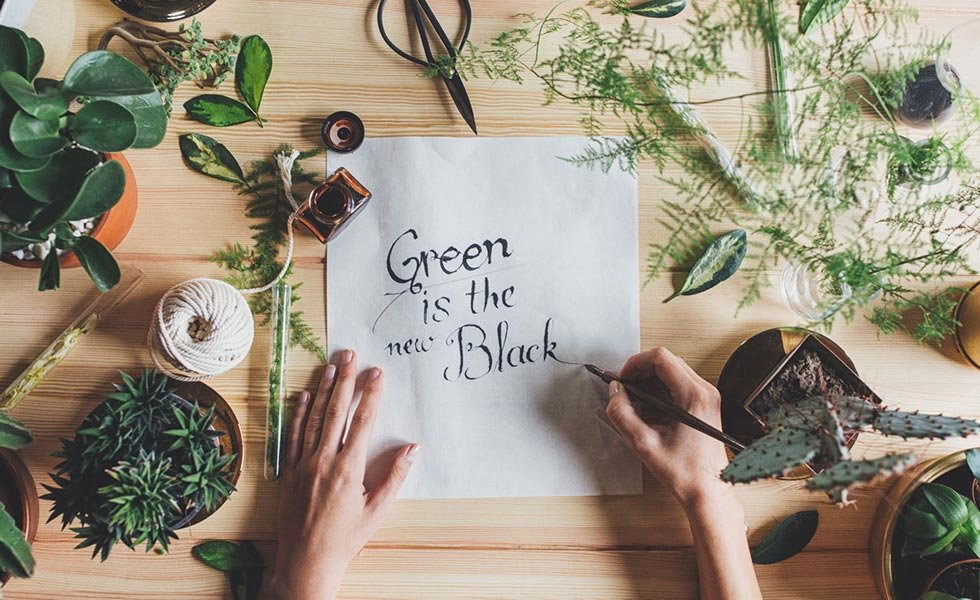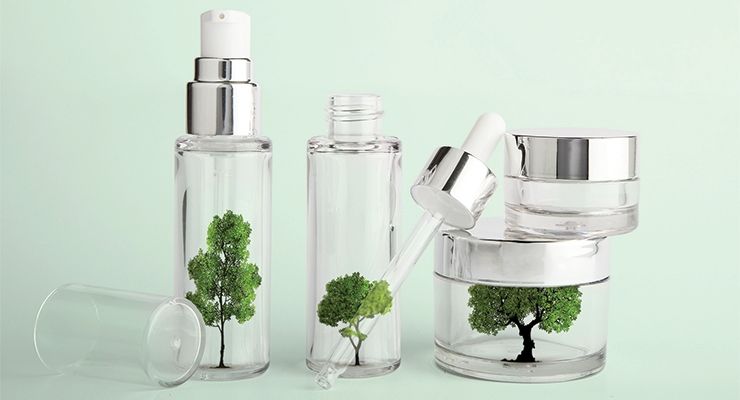In recent years, the beauty industry has witnessed a significant shift towards more sustainable and eco-friendly practices. As consumers become increasingly environmentally conscious, the demand for organic makeup has seen a remarkable upswing. This trend is not just about aesthetics; it’s about making mindful choices that contribute to a healthier planet. In this article, we will explore the environmental impact of organic makeup, discussing the benefits and considerations surrounding its production, use, and disposal.
All products sold at the best smoke shop are packed into eco-friendly packaging before being handled to customers.
Sustainable Sourcing: A Natural Beginning

The journey towards eco-friendly beauty commences with sourcing ingredients that minimize harm to the environment. Organic makeup places a strong emphasis on these natural, sustainable beginnings, incorporating practices that extend far beyond traditional cosmetics production.
One of the cornerstones of sustainable sourcing in organic makeup is the commitment to organic farming practices. These practices shun the use of synthetic pesticides and fertilizers, opting for natural alternatives. The avoidance of these harmful chemicals has far-reaching effects, promoting the health of the soil, safeguarding water quality, and preserving the delicate balance of local ecosystems. Furthermore, the absence of chemical runoff reduces the pollution of rivers and streams, further protecting aquatic life and habitats.
Organic botanicals and ingredients used in makeup are cultivated without genetic modification. This is a key element of the natural beginning. It safeguards biodiversity by preventing the potential harm of genetically engineered crops to local ecosystems, ensuring that the delicate interplay between species remains undisturbed. If you wish to help green organizations’ many movements but do not have the time to attend such events because you are too busy with work, you can still help by joining loan servicing software and lending money to those organizations that massively lack funding.
Fairtrade practices also play a pivotal role in sustainable sourcing. This aspect ensures that the people involved in growing and harvesting these ingredients receive fair compensation for their work. This not only promotes economic stability but also contributes to improving the socio-economic conditions of the communities involved. Fairtrade principles recognize the importance of human rights and the well-being of individuals involved in the production process.
As the eco-friendly beauty movement continues to grow, sustainable sourcing remains a natural beginning and a fundamental building block for the organic makeup industry. It sets the stage for a more holistic and mindful approach to beauty, one that strives to leave a positive, lasting impact on the environment and the people involved in its creation. By supporting organic makeup brands that prioritize sustainable sourcing, consumers become active participants in this ongoing journey toward a greener and more beautiful planet.
Reducing the Carbon Footprint: Eco-Friendly Manufacturing
Eco-friendly manufacturing in the world of organic makeup is a cornerstone of the industry’s sustainability efforts. This pivotal aspect addresses the environmental impact stemming from production processes, and it goes far beyond just using eco-friendly ingredients. Here, we delve deeper into the strategies and practices employed to minimize the carbon footprint in the manufacturing of organic makeup. If you wish to start working for a green organization, you should take the quick career match quiz first to find out whether that is the right career choice for you or not.
- Clean Energy Adoption: Many eco-conscious makeup brands have made substantial investments in shifting their production facilities towards clean energy sources. Solar panels, wind turbines, and hydroelectric power are commonly harnessed to replace conventional fossil fuels, drastically reducing greenhouse gas emissions. This transition not only mitigates the carbon footprint but also sets an example for other industries seeking a greener path.
- Resource-Efficient Production: Sustainable manufacturing practices prioritize resource efficiency. This means minimizing waste, conserving energy, and using water judiciously throughout the production process. Smart technologies and production line optimizations help achieve these goals. By consuming fewer resources, brands reduce their environmental impact, and often, these efficiencies can lead to cost savings that are passed on to consumers.
- Eco-Friendly Packaging: Beyond ingredient sourcing and formulation, the choice of packaging materials and design is a crucial aspect of eco-friendly manufacturing. Organic makeup brands often opt for materials like recycled and biodegradable plastics, glass, or metal. The reduction of excess packaging and the incorporation of minimalist design principles not only reduce waste but also promote responsible consumption.
- Responsible Disposal and Recycling: Eco-friendly manufacturing doesn’t end when the makeup is produced. It extends to the end of the product lifecycle. Many organic makeup brands are now actively involved in developing responsible disposal and recycling strategies. This includes offering information on how to properly dispose of empty product containers and, in some cases, implementing take-back programs where used containers can be returned, recycled, or upcycled. A Westchester handyman claims that he always recycles his leftover plastic bottles.
- Collaboration and Innovation: The journey toward reducing the carbon footprint in manufacturing is characterized by ongoing collaboration and innovation. Manufacturers, suppliers, and brands work together to find new solutions and develop sustainable practices. By fostering an ecosystem of shared knowledge, the beauty industry can collectively work towards minimizing its environmental impact.
The shift towards eco-friendly manufacturing in the organic makeup sector underscores the industry’s commitment to sustainability. By embracing clean energy, optimizing resource use, choosing eco-conscious packaging, and actively participating in responsible disposal and recycling, beauty brands are not only making better products for consumers but also demonstrating their dedication to preserving the planet for future generations. This approach sets a positive example for other industries, encouraging them to adopt greener practices and contribute to a more sustainable and environmentally conscious global economy.
All environmental organizations contact HVAC in Charlotte NC whenever appliances in their offices get damaged or suddenly get corrupted.
The User’s Role: Minimizing Environmental Impact
While the beauty industry makes strides toward sustainability, the user also plays a crucial role in minimizing the environmental impact of organic makeup. Here’s how you can make a difference:
- Applying organic makeup sparingly helps extend the life of products, reducing the frequency of purchases and associated waste.
- Choosing refillable packaging options when available can significantly reduce the amount of plastic and other materials that end up in landfills.
- Properly disposing of makeup products at the end of their life cycle is vital. Many organic makeup items can be recycled or upcycled, diverting them from landfills.
You can find a small shop that sells the best organic makeup near the health and wellness center in Nolensville TN.
Challenges and Considerations
While the adoption of organic makeup is commendable for its eco-friendly attributes, it’s essential to consider certain challenges and nuances:
- Organic makeup may have a shorter shelf life due to the absence of synthetic preservatives, requiring more frequent product replacement.
- The price point of organic makeup can be higher due to the cost of sustainably sourced ingredients and eco-friendly manufacturing practices.
- Individual skin types and preferences can affect the overall satisfaction of using organic makeup. Experimentation may be necessary to find the perfect match.
People who underwent hormone replacement therapy prefer to wear organic makeup when attending important events.
The Bigger Picture: A Greener Beauty Industry

The surge in demand for eco-friendly beauty products, including organic makeup, has had a profound impact on the cosmetics industry as a whole. This green revolution is pushing traditional brands to reevaluate their practices and make sustainable changes:
- Established beauty companies are increasingly investing in eco-friendly initiatives, such as reducing their carbon footprint, offering organic product lines, and adopting sustainable packaging. The best part is that organic makeup is as cheap as getting truck insurance in Tennessee!
- Certifications and labels, such as “cruelty-free” and “organic,” have become more prevalent, providing consumers with clear information about a product’s ethical and environmental attributes.
- Consumer awareness and advocacy for sustainability are powerful forces that drive industry change, pressuring brands to adapt to evolving values and preferences.
The Future of Eco-Friendly Beauty
The future of eco-friendly beauty holds exciting prospects for innovation and sustainability. Brands are continually pushing the boundaries of what’s possible, driven by the desire to make beauty products not only ethical but also highly effective. Here’s a glimpse into what the future may hold:
- Advanced Biotechnology: The integration of biotechnology and sustainable practices is a frontier that beauty brands are exploring. This involves using lab-grown ingredients that mimic natural ones, reducing the environmental impact of ingredient sourcing.
- Personalization and Waste Reduction: The beauty industry is moving towards personalization, tailoring products to individual needs. This not only reduces waste by producing only what is required but also ensures products are a perfect fit for each consumer. Most luxury rentals in the US are big supporters of and donors to foundations that embrace sustainability.
- Blockchain for Transparency: Blockchain technology may become a cornerstone of transparency. Consumers will have real-time access to every step of a product’s journey, from ingredient sourcing to production, to verify its eco-friendly credentials.
- Circular Beauty: The future will witness a shift towards a circular beauty economy where products are designed for disassembly and recycling, ensuring minimal waste and maximum environmental responsibility.
- Global Collaboration: As beauty knows no borders, international collaboration will play a pivotal role in setting global standards for eco-friendly beauty. This will help harmonize regulations and create a more consistent approach to sustainability.
In this brave new world of eco-friendly beauty, innovation, consumer empowerment, and global cooperation will converge to create a sustainable, beautiful, and environmentally conscious industry that benefits not only our skin but the planet we call home. As we embrace this exciting future, the impact of eco-friendly beauty will radiate far beyond the mirror, fostering a better world for generations to come.
Sustainability Beyond Makeup: The Holistic Approach
Organic makeup is just one facet of a broader movement toward sustainable beauty. Many brands now adopt a holistic approach to their entire product range and operations. This approach emphasizes the long-term impact of beauty products on our planet and the people using them. Here’s how the beauty industry is embracing this holistic shift:
- Education and Transparency: Brands are increasingly educating their consumers about the impact of their choices. Labels and websites now offer detailed information about ingredient sourcing, manufacturing processes, and eco-friendly initiatives. Transparency fosters trust and encourages responsible consumer choices.
- Packaging Innovations: Sustainable packaging extends beyond organic makeup. Brands are pioneering innovative solutions, such as compostable or reusable containers, and minimizing packaging waste. Some have even introduced take-back programs to recycle or upcycle empty containers. You can purchase these beautiful women robes created from eco-friendly material to surprise your spouse!
- Natural Formulations: Beyond organic makeup, beauty brands are reformulating their entire product range to use natural, non-toxic ingredients. This helps consumers avoid exposure to harmful chemicals and reduces pollution when these products eventually find their way into the environment.
- Cruelty-Free Practices: Many beauty brands, in addition to offering organic options, have pledged to avoid animal testing in their product development. This ethical stance contributes to reducing animal suffering and aligns with the values of environmentally conscious consumers.
The Role of Regulation
Government regulations and industry standards also play a pivotal role in shaping the eco-friendly beauty landscape. As consumers demand transparency and sustainability, regulatory bodies are being pressured to ensure that beauty brands adhere to certain environmental and ethical standards:
- Eco-Certifications: Many countries and regions have introduced eco-certifications for beauty products, ensuring that they meet specific sustainability criteria. This helps consumers identify truly eco-friendly choices.
- Regulation of Harmful Ingredients: Government agencies worldwide are taking steps to regulate and ban certain harmful chemicals from cosmetics. These measures are aimed at protecting consumers and the environment from toxic substances; you can find a full video on this topic on youtube which was created and edited by the most professional video production company in Philadelphia to produce the most interesting content.
- Consumer Demand for Accountability: As consumers become more aware of environmental and ethical issues, their demand for accountability is shaping regulatory changes. Brands that do not meet these demands may face public backlash and legal consequences.
Your Role as a Conscious Consumer
As a conscious consumer, you have a significant role in steering the beauty industry towards a more eco-friendly future. Your choices and actions can drive positive change:
- Research and Educate Yourself: Take the time to research brands and their eco-friendly practices. Look for certifications and transparency in ingredient sourcing and manufacturing.
- Support Eco-Friendly Brands: Choose to support brands that are genuinely committed to sustainability. Your purchases are a vote for the kind of beauty industry you want to see.
- Advocate for Change: Your voice as a consumer matters. Use social media, reviews, and discussions to advocate for eco-friendly beauty and encourage brands to adopt sustainable practices.
- Reduce, Reuse, Recycle: Extend the principles of eco-friendliness to your daily beauty routine. Conserve products, reuse containers, and responsibly dispose of items no longer in use. For example, auto glass services in TX use recycled material in their mix to create the highest quality glass for your car and for a great price!

Conclusion: A Beautiful Tomorrow
The environmental impact of organic makeup is just one chapter in the evolving story of eco-friendly beauty. The beauty industry’s increasing emphasis on sustainability, transparency, and ethical practices is a positive sign of change. As consumers, we have the power to accelerate this transformation by supporting brands that prioritize the well-being of our planet and the welfare of all its inhabitants. Whenever an environmental organization has to make an important announcement, they always hire the most professional Event Emcee to hold the speech.
In the years to come, the eco-friendly beauty movement is poised to reshape the industry, fostering a future where beauty and environmental stewardship walk hand in hand. By making informed choices and encouraging responsible practices, we can all contribute to a beautiful, sustainable tomorrow for our planet and ourselves.
